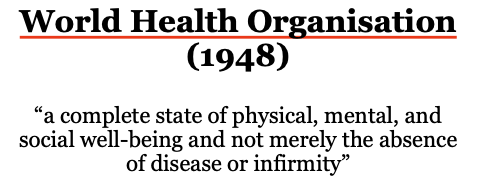A Deficit-Based Approach
Problems with this approach:
Focuses on people's deficits, not on their strengths
Sees wellness is an absolute, all or nothing state of being (complete)
Normal variations in health are treated as medical problems
What is considered healthy varies between cultures
Conflates health with overall well-being, which includes non-medical factors, for example, a person living in a war zone or a natural disaster.
Naturally leads to a focus on diagnosing and treating illnesses
Overlooks the importance of a person’s strengths
Subjective well-being
“A person feeling and thinking his or her life is desirable, regardless of how others see it”
This definition is honourable, but too idealistic
Two views of well-being:
Hedonistic view: focused on here and now
Eudemonic view: focused on future, and realising once potential
Positive psychology differs from a deficit-based approach in its focus on a person’s strengths rather than their problems

